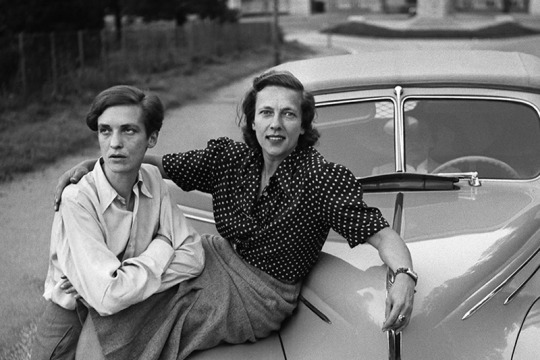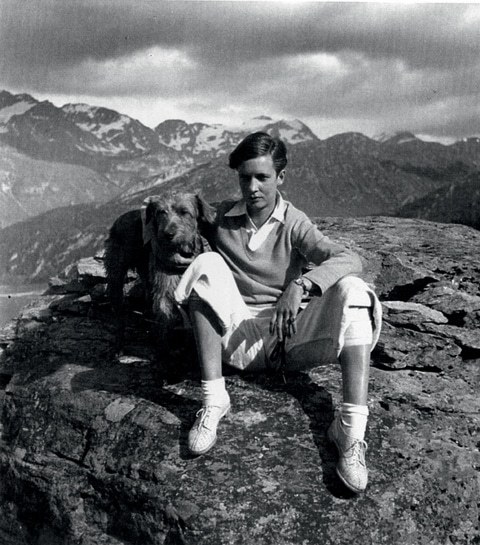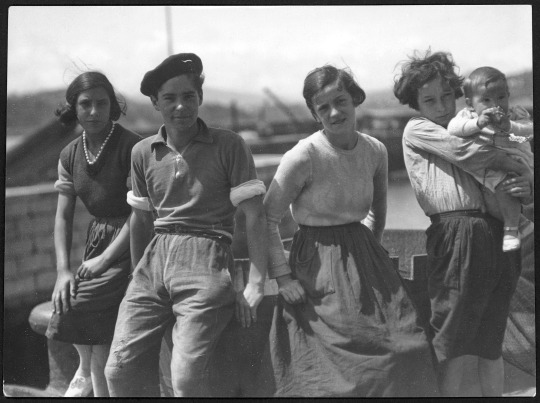#schwarzenbach
Explore tagged Tumblr posts
Text

US Vogue March 1976
Gunilla Lindblad wears the classic Chinese jacket in unlined red cotton poplin. cut to the top of the hip, with a little purple-red ribbed cotton tank top and soft, clingy burgundy jersey pants. Jacket, tank top and pants in cotton and polyester (Schwarzenbach fabrics). All by Marc Bohan for Christian Dior. Photographed at the Palais de la Méditerranée, Nice.
Gunilla Lindblad porte la classique veste chinoise en popeline de coton rouge non doublée. coupé jusqu'en haut de la hanche, avec un petit débardeur en coton côtelé rouge-violet et un pantalon en jersey bordeaux doux et collant. Veste, débardeur et pantalon en coton et polyester (tissus Schwarzenbach).L'ensemble par Marc Bohan pour Christian Dior. Photographié au Palais de la Méditerranée, Nice.
Photo Helmut Newton vogue archive
#us vogue#march 1976#fashion 70s#1976#ready to wear#prêt à porter#french designer#french style#marc bohan#christian dior#schwarzenbach#helmut newton#gunilla lindblad#palais de la méditerranée#nice#côte d'azur
13 notes
·
View notes
Text
Annemarie Schwarzenbach

(i am so glad i learned about her!)
Born in 1908 and died in 1942, she is a Swiss writer, poet, explorer, philosopher, photographer, journalist and traveler (yeah that's impressive!).
Her family was a family of Swiss industrialists from the upper bourgeoisie and close to the far-right ; openly lesbian, she lives with difficulty with them and can't wait to leave.
From 1927, she studied history and literature in Zurich and Paris and then began writing articles for the Swiss press.
In 1930, she became friends with Klaus Mann (writer) and Erika Mann (writer, actress, singer) children of Thomas Mann (writer) and had a long affair with the latter. She supported them in their fight against Nazism. The three friends joined the anti-fascist magazine Die Sammlung.
In 1931, she obtained a doctorate. At the age of 23, she published her first novel, Les Amis de Bernhard. She became friends with Claude Bourdet, Catherine Pozzi's (poet and writer) son and a future member of the French Resistance.
In 1933, Annemarie Schwarzenbach made her first trip as a journalist, travelling to Spain with the photographer Marianne Breslauer.

That same year, she travelled to Persia and decided to marry, in Tehran, Achille Clarac, the secretary of the French legation, who was openly homosexual. She did this so that she was no longer dependent on her parents. Thanks to her marriage, she was able to obtain a diplomatic passport, which facilitated her travels. Obviously, it wasn't a love marriage; the two of them did it to help each other and to be able to live free.
She later returned to Switzerland, then left for the Soviet Union and the United States. In 1938, she underwent several detox treatments for her morphine addiction. She fell in love with one of the women in charge of her treatment. During these stays at the clinic, she wrote "La Vallée Heureuse","Das glückliche Tal" (The Happy Valley).

In 1939-1940, when Europe was once again embroiled in war, she travelled by Ford from Geneva to Kabul, via Iran, with the Swiss traveller, writer and photographer Ella Maillart, a journey marked by her addiction problems. The two women's epic journey is recounted by Ella Maillart in her book "La Voie cruelle". It was during this journey that Annemarie Schwarzenbach wrote "Un hiver au Proche-Orient". She also wrote various reports for Swiss newspapers.

On her return, she went back to the United States, where her addiction to morphine, her depressive tendencies and her suicide attempts forced her to undergo several psychiatric treatments. She then became interested in the trade union movement. In New York, she befriended Carson McCullers, who fell madly in love with her and dedicated "Reflections in a Golden Eye" to her.
During a stay in the Belgian Congo, Annemarie Schwarzenbach joined the Free French forces in Brazzaville; she was mistaken for a Nazi spy. Disturbed by this comparison, she began writing a series of poems, including Les Rives du Congo-Tétouan. In 1942, having regained her serenity, she decided to return to Switzerland.

On 7 September 1942, a fall from her bicycle seriously injured her head. She was treated in a psychiatric hospital in Prangins, with electric shocks. Her mother then had her taken back to the Engadine, where she died on 15 November, aged 34.
After her death, her mother chose to destroy a large part of her correspondence. However, the Annemarie Schwarzenbach fonds is preserved at the Swiss Literary Archives in Bern and was made freely accessible on Wikimedia Commons in 2017. She was nicknamed the "inconsolable angel" by the French writer Roger Martin du Gard.
She has created a number of novels, poems, photos and reports during her many travels, and I invite you to take a look at her work!!! She was such an interesting person!!!
I love women with a thirst for life and the world like that; she wanted to discover everything, and created such interesting things!!!
Do check her books, her poems and her photos!
#lesbian#lesbian pride#pride#pride month#history#pride history#lesbian history#lesbian culture#annemarie schwarzenbach#photography#poetry#travel#writing#writer#lesbian writer#lesbian photographer
59 notes
·
View notes
Text




Genuinely frothing at the mouth .. world's most beautiful diva .. . Her and annemarie schwarzenbach life ruining crossover episode .. second pic is literally the most beautiful pic I've seen ever maybe
#vintage photography#vintage photo#vintage fashion#vintage style#1920s#1920s fashion#1930s#queer history#annemarie schwarzenbach#ruth landshoff#weimar photography#weimar republic#bisexual history#lesbian history#vintage lesbians#jewish history
12 notes
·
View notes
Text

Annemarie Schwarzenbach in Persepolis (1934)
48 notes
·
View notes
Text

Annemarie Schwarzenbach, «...y un ser humano al límite de sus fuerzas» en Muerte en Persia. Traducción de Richard Gross y María Esperanza Romero.
21 notes
·
View notes
Text

Annemarie Schwarzenbach (Swiss, 1908–1942)
Group of young people, San Sebastián, Spain, 1933
Swiss Literary Archives, Bern
104 notes
·
View notes
Text








19 notes
·
View notes
Text

Annemarie Schwarzenbach and her Mercedes (1932) photographed by Marianne Breslauer
#classic#style#gay#art#black and white photography#gay history#lgbt art#lgbt history#lgbt#annemarie schwarzenbach#marianne breslauer
19 notes
·
View notes
Photo

Annemarie Schwarzenbach, Untitled, USA,1937
https://en.wikipedia.org/wiki/Annemarie_Schwarzenbach
77 notes
·
View notes
Text

Klaus Mann, November 18, 1906 – May 21, 1949.
With Annemarie Schwarzenbach, Erika Mann, and Ricki Hallgarten.
41 notes
·
View notes
Text

Annemarie Schwarzenbach (Swiss, 1908–1942): Group of young people, San Sebastián, Spain, 1933.
31 notes
·
View notes
Text

Annemarie Schwarzenbach (photo by Anita Forrer, 1938)
Annemarie Minna Renée Schwarzenbach (23 May 1908 – 15 November 1942) was a Swiss writer, journalist and photographer. Her bisexual mother brought her up in a masculine style, and her androgynous image suited the bohemian Berlin society of the time, in which she indulged enthusiastically. Via Wikipedia
11 notes
·
View notes
Text


Doodling some Annemaries before my French test
5 notes
·
View notes
Text

14 notes
·
View notes
Text

Mopsa Sternheim (1933) - Annemarie Schwarzenbach
15 notes
·
View notes
